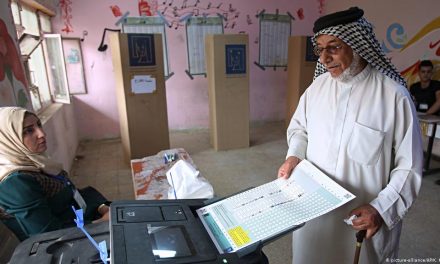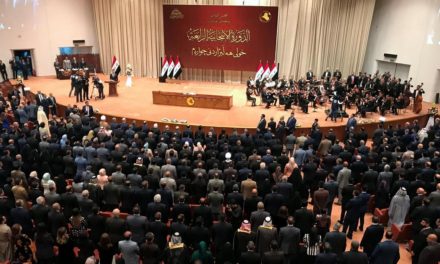The Iraqi government’s long-awaited “White Paper” was formally approved by cabinet on October 13 after it was shared with members of parliament, who will now undertake a thorough review. Billed as a blueprint for addressing Iraq’s economic woes, its completion had been a source of tension between parliament and the government. But yesterday’s milestone was only the first step in an arduous journey that Prime Minister Mustafa Al-Kadhimi’s government must undertake if it is to deliver on its bold promises. With time running out, the difficult task of garnering sufficient political buy-in must be accelerated if the 95-page document is to be translated into tangible changes.
The White Paper lays out a three-year plan for how Iraq’s financial predicament can be reversed. The first half of the document presents the scale of the problem in intricate detail, utlilsing charts and figures to illustrate what is at stake if the country continues on the current downward spiral. This level of detail is not only useful for policymakers, but can also be harnessed to communicate persuasively with the public.
The second half of the document outlines a series of specific reform measures that the government intends to pursue to advance five key areas: sustainable fiscal stability, macroeconomic reforms, building vital infrastructure, provision of essential services, and creating an administrative and legal environment that is conducive to growth.
The paper sets out a strategy that prioritises the urgent need to “stop the haemorrhaging of the fiscal deficit” that is symptomatic of the massive spending commitments in the public sector. Reining in public expenditure would in turn create a sufficient amount of fiscal space for the government to target the sorts of macroeconomic reforms that are vital to overhauling Iraq’s deep-seated structural problems and resurrecting the non-oil sectors.
The document offers an ambitious proposition and in total sets out more than 200 actionable reform measures including legislative amendments, digital innovations and major cuts in subsidies. Naturally, the most obvious question to ask is, can the government pull this off, and if so, how? The authors note that once the paper is approved by parliament, the government will prepare a separate action plan that details how it will implement the proposed measures along a defined timeline. This is, of course, easier said than done. Implementation has always been the Achilles heel of reform-minded policymakers and there is little reason to believe that this attempt will be any less problematic.
A key component of implementation is the political will to undertake unpopular actions that will inevitably create some public backlash. For instance, the paper pledges to significantly curtail public sector hiring and aims to slash the public payroll from 25% to 12.5% of GDP within three years. But Kadhimi’s five-month record has shown that he has little inclination to resist popular demands for more government jobs. Since May, protests and sit-ins by unemployed graduates demanding government jobs have multiplied, and on some occasions Kadhimi has personally relented. With few viable options in the private sector for tens of thousands of young people in search of employment, the problem has been compounded by outlandish promises that cannot be honoured in the near-term.
With much fanfare, the government launched the online portal Tawtheef earlier this week, advertised as a major milestone towards helping thousands of ordinary people find employment. The prime minister’s spokesperson claimed that the initiative would serve as a fully automated service that would enable job seekers to find and obtain employment without any human intervention. But there was little effort to clarify that in fact there are no jobs currently available on the system and that the Tawtheef website’s sole function right now is an electronic form where job seekers can submit their personal details and register their general interest.
The release of the White Paper has further heightened public expectations, and the government will need to be frank and transparent about what it actually plans to achieve in the remaining time it has left before elections. Many of the reform measures proposed in the paper have been attempted by previous governments and have yielded minimal outcomes. For example, the authors aim to cut financial support to state-owned enterprises (SOEs) by 30% for three consecutive years. They propose categorising SOEs into profitable, faltering and unviable entities. Many viable companies would then undergo complete or partial privitisation, while those that cannot be salvaged would be liquidated. Given the huge source of political patronage that SOEs generate, any attempt to break them up would face formidable resistance from vested interests.
If the government is seriously committed to what it sets out in the White Paper, it will need to devote far more political capital to economic reform than it has in the past. To bring about tangible reform, it is not enough to delegate this task to the technocrats and bureaucrats, no matter how informed they may be. The prime minister’s personal attention will be crucial to generate enough momentum to bring about real change.

Ali Al-Mawlawi
Ali Al-Mawlawi is a policy consultant and analyst who has spent over a decade writing about Iraq. He was formerly the head of research at the Baghdad-based policy center, Al-Bayan Center for Planning and Studies, and has written extensively on public finance spending, decentralization and policy planning. His current area of interest focuses on Iraq’s political economy and its impact on institutional reform measures.











Excellent and brief analysis with a solid conclusion.